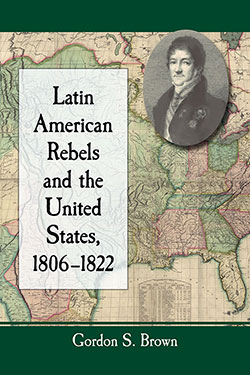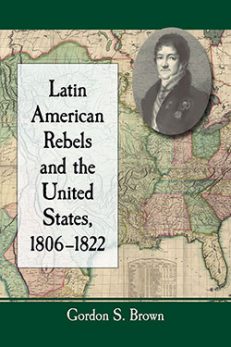Latin American Rebels and the United States, 1806–1822
$35.00
In stock
About the Book
When separatist revolts erupted in Spain’s American colonies in the early 1800s, opinion in the United States was undecided as to what position to take. Proximity and America’s own anti-colonial ethos favored sympathy with the rebel cause, yet U.S. strategic interests during the tumultuous Napoleonic Wars dictated a policy of neutrality.
When representatives of the rebel provinces came to the U.S. seeking support, arms or recognition, and even launched armed assaults on Spanish territory and shipping from U.S. soil, American opinion split sharply. Should the untested rebel regimes be officially recognized or should the U.S. protect its crucial neutrality? As rebel agents and Spanish diplomat-spies vied behind the scenes for U.S. political and military assets, it became clear that the U.S. had inadvertently become involved in Spanish America’s revolutionary struggle.
About the Author(s)
Bibliographic Details
Gordon S. Brown
Format: softcover (6 x 9)
Pages: 212
Bibliographic Info: 2 maps, notes, bibliography, index
Copyright Date: 2015
pISBN: 978-0-7864-9899-4
eISBN: 978-1-4766-2082-4
Imprint: McFarland
Table of Contents
Table of Contents
Preface 1
Timeline 5
Introduction 11
1. Uneasy Neighbors 17
2. Contested Loyalties 32
3. The First Rebel Agents Show Up 45
4. Filibusters, American and Émigré 58
5. Bringing American Privateers into the Fight 74
6. More Rebel Schemes for Armed Intervention 89
7. The Rise and Fall of the Republic of the Floridas 103
8. Hindering the Privateers 115
9. Recognition or Neutrality? 130
10. Agreement with Spain 143
11. Success Is a Matter of Fact 159
12. The End of the Beginning 172
Chapter Notes 183
Bibliography 193
Index 201
Book Reviews & Awards
• “This is a lively study of a unique juncture in American history that is not often addressed by modern historians”—The Foreign Service Journal
• “[Brown] capably lays out key narratives in this international side of the Latin American revolutions. Brown accomplishes his task skillfully and provides an accessible read for undergraduates and interested scholars alike.”—H-Net Reviews
• “This study investigates the U.S. response to independence movements in Mexico and South America during the early decades of the 19th century, revealing the pressures put on America’s policy of neutrality as a result of the arrival in the U.S. of refugees and activists from the rebellious Spanish colonies. …A detailed timeline is included.”—ProtoView





